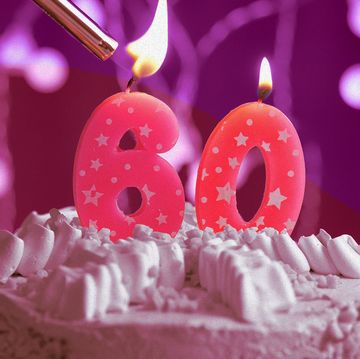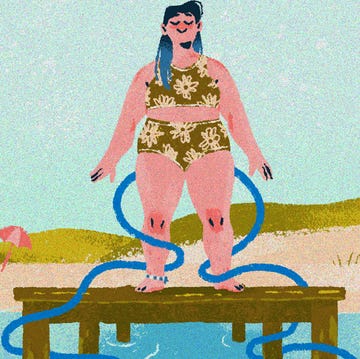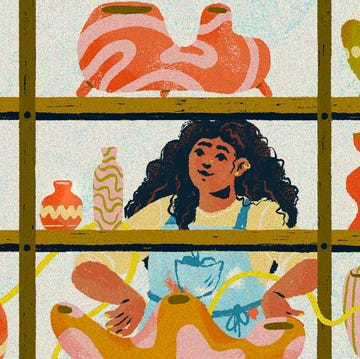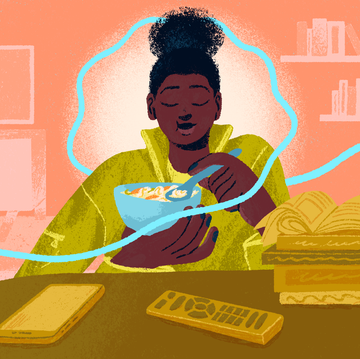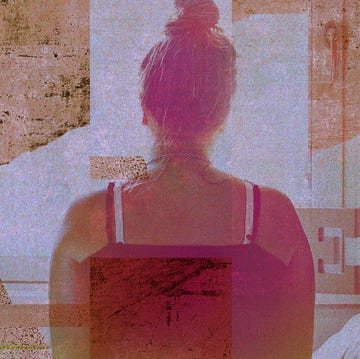When I first told people that I was planning to give up dessert for a month, more than a few were skeptical. “Are you sure you can make it that long?” one friend asked, while another simply laughed and said, “Good luck with that.” Their reactions were justified.
Among my friend group and pretty much anyone I’ve ever met, I’m known as a dessert fanatic, someone who can inhale a pint of Ben & Jerry’s in minutes and devour a tray of Oreos. My cabinets are full of sprinkles and M&M’s; my office is home to cone-shaped planters and cupcake notepads. The idea of me going 30 days without something sweet seemed, understandably, absurd.
While I shared my friends’ doubts, I was committed to making it work. My lifelong love for dessert had turned in recent years into a full-blown addiction. Instead of just craving sweet treats every now and then, I indulged in them constantly, and often to excess: piling my bowl high with scoops of ice cream, cutting massive slices of cake, reaching into the box for just one more cookie.
Because I ate fairly well otherwise and exercised often, my weight and cholesterol remained healthy for my body type, but it wasn’t unusual for me to wake up in the morning with a stomachache from overdoing it the night before. Each time, I’d swear that I wasn’t going to have any dessert that evening. By dinnertime, I’d be craving sugar so strongly that my earlier promise would be all but forgotten.
I adored the flavor of cookie dough and the creaminess of red velvet cupcakes, however, taste wasn’t the driving force of my addiction. I ate dessert because my brain told me I needed to eat dessert, that I wouldn’t be happy or satisfied if I didn’t order that boozy milkshake. No matter how full I was from dinner, or how bad I felt from a night of bingeing, I nearly always found the possibility of dessert too tempting to resist.
My combination of OCD and ADHD made things worse. If I knew there was a sweet nearby, I couldn’t focus on anything else until I had it. I thought compulsively about what dessert I was eating, when I was eating it, and whether it was better to save half for the next night so I wouldn’t be as full or eat it in one go.
I talked about the subject obsessively, annoying my husband and any friends unlucky enough to be with me when I was gleefully browsing the dessert menu. I hated being that person. I badly wished that I could have a normal relationship with junk food, one in which I controlled my urges, not the other way around.
Previously, when I tried to ban dessert from the house, I’d end up making an excuse for myself (“It’s a special occasion,” “I had a hard day,” “There’s nothing wrong with a little ice cream, right?”) and inevitably give in. I’d usually then have way too much to make up for “depriving” myself of dessert.
Last year, I decided enough was enough. I’d spent a few months feeling sluggish and bloated. My regular habits were exacerbated by serious overeating on birthdays, holidays, and vacations. I’d just turned 29, and the prospect of soon being in my 30s made me want to take my well-being more seriously than in the past.
With the support of my husband (who’d just had a scary accident that also had him prioritizing his health), I decided to embark on an ambitious plan: absolutely no dessert for an entire month, no matter how badly I craved it or how hard it felt to say no. The goal? Not just to give my body a short-term cleanse (although it was certainly needed) but also to change my relationship with food. I wanted to take back control of my urges and put my brain, not my sweet tooth, in the driver’s seat.
The first few days were easy enough. I skipped the dessert aisle in the grocery store without issue, happily filling my cart with healthier snacks like mangoes, grapes, and popcorn. The problems didn’t come until the weekend. It wasn’t too unusual for me to go lighter on dessert during the weekdays, but on Fridays and Saturdays, I barely ever ended the night without some kind of tasty confection.
That first weekend, I craved ice cream like nobody’s business. I even dreamed of eating it, waking up both relieved that I hadn’t and jealous of my dream self who did indulge. It was so hard to quiet the voice in my head that told me, It’s Saturday; you need to have ice cream on Saturdays.
I was determined to not let that voice govern my choices. I wanted to be more mindful about why and how I consumed food, both dessert and otherwise. I asked myself a few questions each evening: Was I really still hungry? If so, what for? What was my body really craving? More often than not, I ended up opting for one of the healthy snacks I’d bought. I was surprised to discover that my constant need for a post-dinner treat was actually a habit.
The fact that my husband and I were eating healthier overall also helped a lot. Ironically, in the past, our weekend dinners of takeout pizza or Chinese would be so indulgent that I’d feel less guilty about having dessert afterward because I was already eating “badly.” But when we switched to more nutritious dinner alternatives, I felt more inclined to stick to the healthy route and not ruin how I felt with sweets.
After a week, I was shocked to realize that I felt good. Not eating dessert had a notable impact on my physical and mental state. For one, my stomach stopped hurting almost immediately, a clear result of less dairy and sugar. For another, my skin started clearing up — ahem, chocolate — and then there was my stamina. I’ve never been a strong runner, but I found myself able to go for longer and more easily than in the past. My energy level was higher, and my mood felt more even.
As glad as I was to see these results, part of me felt resentful. I didn’t want to feel better without dessert. I loved dessert! Did this mean I needed to give it up completely, forever, in order to stay feeling good? The idea had me panicking. Then, I reminded myself that the goal wasn’t to never have sweets again. It was to reset my body and mindset enough so that I could have them occasionally and with genuine satisfaction.
Halfway through the month, my husband and I flew to Los Angeles for our friends’ wedding. This would be a decadent occasion full of drinks, tacos, and, yes, dessert. We decided that we were both going to allow ourselves some small treats. Going in, I was worried that I would overdo it, stuffing my mouth with cake and cookies like I’d always done in the past after taking a break from dessert.
In reality, I kept it under control, only having a chocolate-covered Oreo (my favorite) and a banana pudding cake shot. (I mean, come on. How could I not?) And because I chose these items carefully rather than mindlessly, the taste of both treats felt elevated. I ended the night full, happy, and proud of myself for my behavior.
My small wedding “cheat” actually felt like it fully satisfied my dessert craving for the time being rather than exacerbating it. Later in the month, for instance, when some friends pulled out cupcakes at a party, I found myself automatically wondering how the flavor would taste and if I had room in my stomach for one.
I rarely, if ever, had asked myself such questions before chowing down. It was easy for me to say no because I knew that I wanted the next dessert that I did have, whenever that was, to be something as perfectly satisfying as those wedding treats.
When the month came to an end, I decided to extend my dessert ban for a few extra days to make up for the wedding. When that deadline passed and I still wasn’t craving sweets that much, I opted to wait until the next weekend, and when that date came and went, I settled on Valentine’s Day as the perfect first night “back.”
After seeing a comedy show, my husband and I stopped at our favorite local ice cream shop, and each got a cup. It was delicious, 10 times better than usual because I truly wanted it rather than just eating it out of habit. I finished the cup completely and was totally satisfied.
Since then, I’ve had dessert a few times, but barring one exception (an Oreo-strawberry milkshake about the size of my arm), always within reason. I’m listening to my body’s cravings and fullness, stopping when I’ve had enough and reminding myself, as often as I need to, that I’ll be perfectly fine if I leave the dessert in the freezer.
It’s not perfect. I still think about sweets more often than I’d like. However, it’s much better than it used to be. I feel so much more connected to my body than I did a few months ago and so much more in control of my sugary compulsions. That one-month break may have been a challenge, but I’m so glad I did it — and I don’t need to celebrate with dessert to feel good about how far I’ve come.
Rachel Simon is a Raleigh, North Carolina-based writer who has contributed to The New York Times, Glamour, and Marie Claire. Follow her on Twitter @rachel_simon.
Get Shondaland directly in your inbox: SUBSCRIBE TODAY






